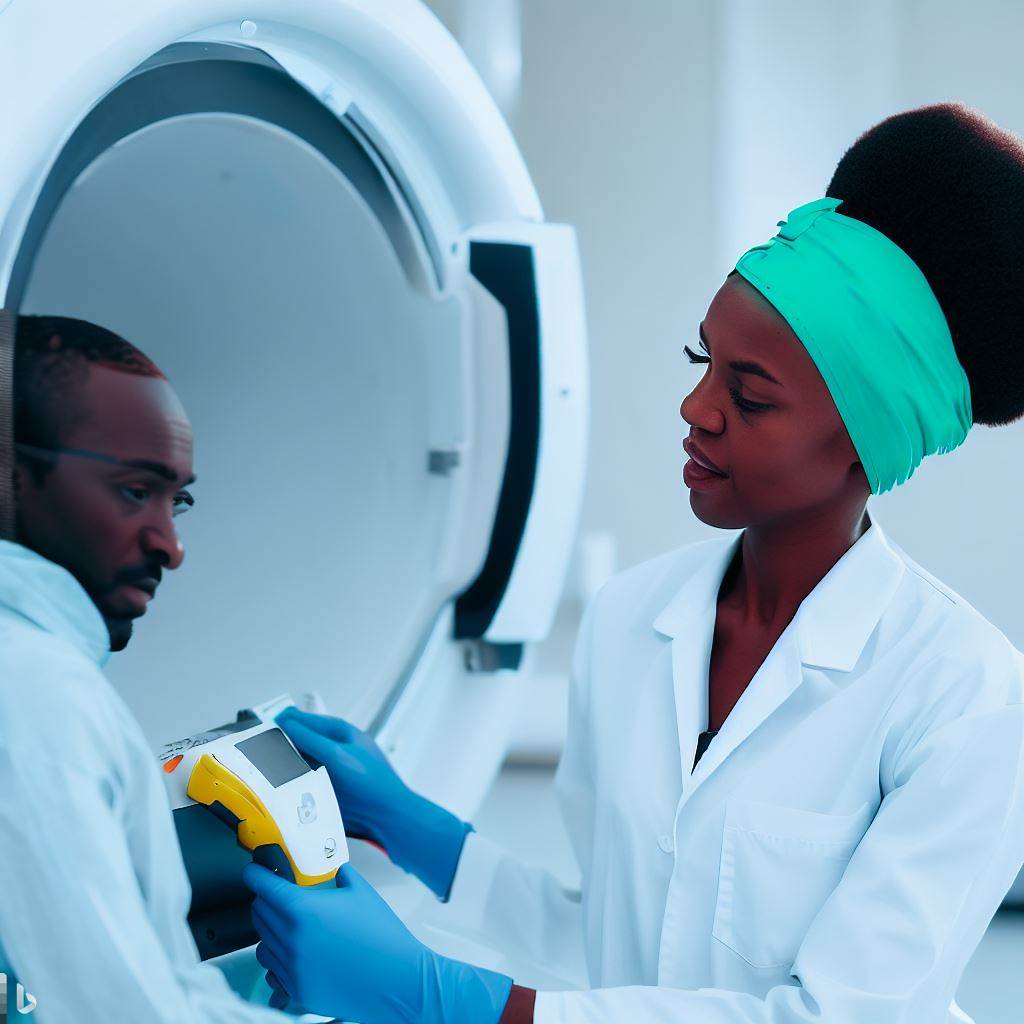Introduction
Radiation therapy is a crucial treatment option for cancer patients, utilizing high-energy radiation to shrink tumors and destroy cancerous cells.
Radiation therapists play a vital role in this process, ensuring accurate implementation of treatment plans and patient safety.
In this blog post, we will explore the working conditions faced by radiation therapists in Nigeria, including their challenges and rewards.
Working as a radiation therapist in Nigeria brings its own unique set of concerns and rewards.
Radiation therapists in Nigeria often face challenges such as limited resources, inadequate infrastructure, and lack of public awareness.
Despite these challenges, radiation therapists in Nigeria find immense satisfaction in helping patients fight against cancer.
With dedicated professionals and advancements in technology, radiation therapy in Nigeria is steadily improving.
Efforts are being made to improve working conditions, such as increasing funding for equipment and training opportunities.
However, more support from the government and the healthcare system is needed to ensure proper working conditions for radiation therapists.
Exploring the working conditions for radiation therapists in Nigeria sheds light on the challenges they face and the improvements needed.
In the next sections, we will delve deeper into specific areas that affect the working conditions of radiation therapists in Nigeria.
Current State of Radiation Therapy in Nigeria
Brief history of radiation therapy in Nigeria
- Radiation therapy was introduced in Nigeria in the early 1960s.
- The first radiation therapy facility was established at the University College Hospital, Ibadan.
- Initially, the focus was on treating patients with skin cancers using conventional radiation therapy techniques.
- Over the years, advancements in technology have allowed for more precise and targeted radiation therapy.
- Training programs for radiation therapists were later established to meet the growing demand.
Overview of the number of radiation therapy facilities in the country
- Currently, there are a total of 12 radiation therapy facilities across Nigeria.
- These facilities are located in major cities such as Lagos, Abuja, Ibadan, and Kano.
- Some of the prominent radiation therapy centers include the National Hospital Abuja and the Lagos University Teaching Hospital.
- These facilities are equipped with modern radiation therapy machines and offer a range of treatment options.
- However, the number of facilities is still insufficient to meet the increasing demand for radiation therapy services.
Discussion on the availability and accessibility of radiation therapy services
- Access to radiation therapy services in Nigeria is a major challenge, especially for patients living in rural areas.
- The limited number of facilities hampers the accessibility of treatment for many Nigerians.
- Long distances and transportation issues make it difficult for patients to access radiation therapy centers.
- The cost of treatment is another barrier to accessibility, as radiation therapy can be expensive.
- Public hospitals typically have long waiting times for radiation therapy due to the high patient load.
- Private facilities offer faster access to treatment, but the cost may be prohibitive for many Nigerians.
Basically, the current state of radiation therapy in Nigeria presents both progress and challenges.
Although there has been significant growth in the number of facilities and advancements in technology, access to radiation therapy services remains a major issue.
The limited number of facilities and the high cost of treatment make it difficult for many Nigerians, especially those in rural areas, to access the care they need.
Efforts should be made to increase the number of radiation therapy facilities and improve the accessibility of treatment for all Nigerians.
Read: Demystifying MRI Technology: A Layman’s Guide in Nigeria
Qualifications and Training of Radiation Therapists in Nigeria
Educational requirements for becoming a radiation therapist
- In Nigeria, individuals aspiring to become radiation therapists must meet specific educational requirements.
- The minimum educational requirement is a bachelor’s degree in radiation therapy or a related field.
- Prospective radiation therapists typically enroll in universities or colleges offering accredited radiation therapy programs.
- These programs provide theoretical and practical training necessary for a successful career in radiation therapy.
- Students learn about radiation physics, biology, dosimetry, treatment planning, patient care, and ethical considerations.
- The curriculum also includes clinical rotations, allowing students to gain hands-on experience in a real healthcare setting.
- In general, the educational requirements ensure that radiation therapists possess the knowledge and skills needed to perform their duties effectively.
Accreditation and certification processes for radiation therapy programs
- In Nigeria, radiation therapy programs must undergo accreditation by relevant regulatory bodies.
- The National Universities Commission (NUC) and the Radiographers Registration Board of Nigeria (RRBN) are responsible for accrediting and regulating these programs.
- Accreditation ensures that the programs meet established standards of quality and provide adequate training.
- Furthermore, radiation therapists are required to obtain certification from the RRBN to practice legally in Nigeria.
- The certification process involves passing a national examination that assesses the therapist’s knowledge and competency.
- Obtaining certification is vital as it demonstrates the therapist’s qualifications and commitment to professional development.
Discussion on the quality of training and its impact on working conditions
- The quality of training plays a significant role in shaping the working conditions for radiation therapists in Nigeria.
- A well-rounded education equips therapists with the necessary skills to provide safe and effective radiation treatments.
- Therapists who have received comprehensive training are better equipped to handle complex cases and ensure patient safety.
- Furthermore, quality training enhances job satisfaction, as therapists feel confident and competent in their abilities.
- Continuous professional development opportunities also contribute to improving working conditions for radiation therapists.
- Access to workshops, conferences, and research advancements enables therapists to stay updated with the latest practices.
- However, any shortcomings in the quality of training can negatively impact working conditions.
- Inadequate training may lead to errors, compromising patient safety and therapist job satisfaction.
- Insufficient resources, outdated equipment, and limited access to advanced technologies can also hinder effective practice.
- Therefore, it is crucial for educational institutions and regulatory bodies to prioritize the continuous improvement of training programs.
- By ensuring rigorous standards, adequate resources, and ongoing professional development opportunities, the working conditions of radiation therapists in Nigeria can be enhanced.
Read: The Evolution of Radiation Therapy in Nigerian Healthcare
Job Prospects for Radiation Therapists in Nigeria
Demand for radiation therapy services in the country:
- Radiation therapy services are in high demand in Nigeria due to the increasing prevalence of cancer.
- The number of cancer cases has been rising steadily, leading to a greater need for radiation therapists.
- The healthcare system in Nigeria is recognizing the importance of radiation therapy in cancer treatment.
- As a result, there is a growing demand for qualified radiation therapists who can deliver effective treatments.
Employment opportunities in public and private healthcare sectors
- Radiation therapists in Nigeria can find employment opportunities in both the public and private healthcare sectors.
- In public healthcare institutions, such as government hospitals, radiation therapists are needed to treat cancer patients.
- Private healthcare facilities, including specialized cancer centers, also require radiation therapists to provide their services.
- The employment prospects for radiation therapists are promising in both sectors, with various job openings available.
Discussion on the competition and salary prospects
- The competition for radiation therapy jobs in Nigeria can be intense due to the limited number of positions available.
- However, with the increasing demand for radiation therapy services, the number of job opportunities is expected to rise.
- Qualified radiation therapists who possess advanced skills and experience have an advantage in the job market.
- It is crucial for aspiring radiation therapists to continuously upgrade their knowledge and skills to stay competitive.
- In terms of salary prospects, radiation therapists in Nigeria can earn a competitive salary.
- The exact salary may vary depending on factors such as qualifications, experience, and the employing institution.
- Generally, radiation therapists receive a salary that reflects their importance in the healthcare sector.
- With the continuous growth and recognition of radiation therapy services, salary prospects are expected to improve.
In essence, the job prospects for radiation therapists in Nigeria are promising due to the increasing demand for radiation therapy services.
Both the public and private healthcare sectors offer employment opportunities for qualified professionals.
However, competition can be intense, making it important for aspiring radiation therapists to continuously upgrade their skills.
Despite the competition, radiation therapists can earn a competitive salary that reflects their importance in the healthcare sector.
With the continuous growth of radiation therapy services, salary prospects are expected to improve in the future.
Read: How to Kickstart Your Career as a Radiation Therapist in Nigeria
Working Environment for Radiation Therapists in Nigeria
Overview of the work setting in radiation therapy departments
- The work setting for radiation therapists in Nigeria varies depending on the healthcare facility.
- In major hospitals, radiation therapy departments are specifically designed to cater to cancer patients.
- These departments are equipped with state-of-the-art technology to facilitate accurate diagnosis and treatment.
- Radiation therapists work closely with oncologists, radiologists, and other healthcare professionals to provide comprehensive care.
- They collaborate in multidisciplinary teams to ensure the best treatment outcomes for patients.
Discussion on the availability and functionality of equipment
- The availability of equipment in radiation therapy departments in Nigeria is a major concern.
- Many healthcare facilities lack the necessary resources to invest in advanced radiation therapy machines.
- This poses challenges for radiation therapists in delivering optimal care to their patients.
- Outdated or malfunctioning equipment can lead to delays in treatment and compromised patient safety.
- In some cases, radiation therapists have to rely on manual techniques due to the unavailability of modern technology.
Analysis of workplace safety measures and adherence to radiation protection protocols
- Workplace safety is of utmost importance in radiation therapy departments.
- Radiation therapists in Nigeria strive to ensure the safety of both patients and themselves.
- They strictly adhere to radiation protection protocols to minimize the risks associated with radiation exposure.
- These protocols include wearing appropriate protective gear, maintaining distance from radiation sources, and following proper handling procedures.
- Regular safety audits and training programs are conducted to reinforce adherence to safety protocols.
In short, the working environment for radiation therapists in Nigeria presents both opportunities and challenges.
While major hospitals provide a conducive work setting with access to advanced technology and collaboration with other healthcare professionals, the availability and functionality of equipment remain a concern in many healthcare facilities.
Additionally, ensuring workplace safety and adherence to radiation protection protocols is crucial for radiation therapists to provide effective and safe treatment to their patients.
Continuous efforts to improve working conditions, infrastructure, and training programs are essential to enhance the quality of radiation therapy services in Nigeria.
Read: Continuing Education Opportunities for MRI Techs in Nigeria

Challenges and Issues Faced by Radiation Therapists in Nigeria
Shortage of radiation therapists in the country
The shortage of radiation therapists in Nigeria presents a significant challenge in providing adequate healthcare services to cancer patients.
This shortage is due to limited training institutions and the lack of awareness about the profession, leading to a small workforce.
As a result, the workload for radiation therapists is often overwhelming, making it difficult to provide quality care to all patients.
Furthermore, the shortage hampers the efficiency of cancer treatment centers and prolongs waiting times for patients in need of radiation therapy.
Heavy workload and long working hours
Radiation therapists in Nigeria often face heavy workloads and long working hours.
Due to the shortage of therapists, they are required to handle a large number of patients, often back-to-back, throughout the day.
This excessive workload can lead to fatigue and burnout, compromising the quality of care provided to patients.
The long working hours also affect the work-life balance of radiation therapists, creating challenges for their personal lives and overall well-being.
Lack of continuous professional development opportunities
Radiation therapists in Nigeria struggle with limited opportunities for continuous professional development.
There is a lack of specialized training programs, workshops, and conferences that can enhance their knowledge and skills in radiation therapy.
This lack of professional development opportunities hinders their ability to stay updated with the latest advancements in the field.
As a result, radiation therapists may find it difficult to provide optimal care using the most advanced techniques and technologies available.
Impacts of inadequate infrastructure and funding on working conditions
The inadequate infrastructure and funding for radiation therapy services have a significant impact on the working conditions of therapists in Nigeria.
There is a lack of modern equipment, such as linear accelerators, necessary for delivering precise and effective radiation treatments.
Outdated or malfunctioning equipment not only compromises patient care but also increases the workload and stress on radiation therapists.
Additionally, the lack of funding leads to limited resources for maintaining and upgrading existing equipment, further hindering the provision of quality care.
In a nutshell, radiation therapists in Nigeria face several challenges and issues in their working conditions.
The shortage of therapists, heavy workloads, and long working hours hinder their ability to provide optimal care.
The lack of continuous professional development opportunities and inadequate infrastructure and funding further exacerbate these challenges.
Addressing these issues requires investment in training programs, improving infrastructure, and providing adequate resources and support to radiation therapists.
By prioritizing the improvement of working conditions, the quality of care provided to cancer patients in Nigeria can be significantly enhanced.
Read: Occupational Therapy Schools: Where to Study in Nigeria
Quality of Life for Radiation Therapists in Nigeria
Impact of working conditions on the mental and physical well-being of therapists
- Long working hours can lead to mental and physical fatigue.
- Inadequate staffing levels can result in increased workload and stress.
- Poor radiation protection measures may jeopardize therapists’ health.
- Limited access to proper training and professional development can hinder career growth.
- Lack of support from management and colleagues can negatively impact therapists’ morale.
Discussion on the support systems available in the workplace
- Some clinics offer counseling services to help therapists cope with job-related stress.
- Peer support programs are implemented to foster camaraderie and mutual assistance.
- Regular team meetings provide a platform for therapists to voice concerns and seek solutions.
- Supervisors play a crucial role in providing guidance and support to therapists.
- Administrative staff help in streamlining paperwork and administrative tasks, reducing therapists’ burden.
Measures taken to promote work-life balance and occupational satisfaction
- Flexible working hours allow therapists to meet personal commitments and achieve work-life balance.
- Encouraging hobbies and outside interests helps therapists unwind and maintain overall well-being.
- Competitive salaries and benefits improve therapists’ job satisfaction and financial stability.
- Recognition programs acknowledge therapists’ contributions and boost their motivation.
- Continuous training opportunities help therapists stay updated and engaged in their profession.
Basically, the working conditions for radiation therapists in Nigeria greatly impact their quality of life.
Long working hours, inadequate staffing, and poor radiation protection measures can have detrimental effects on their mental and physical well-being.
However, various support systems are available in the workplace, such as counseling services, peer support programs, and regular team meetings, to alleviate some of the challenges.
Measures promoting work-life balance, occupational satisfaction, and professional development also contribute to improving therapists’ overall quality of life.
It is essential to address the working conditions and enhance the support systems to ensure a positive and fulfilling experience for radiation therapists in Nigeria.
Read: Step-by-step Guide to Becoming a Nursing Assistant in Nigeria
Gain More Insights: Personal Experiences: Life as a Physician Assistant in Nigeria
Suggestions for Improving Working Conditions
Need for increased government funding in radiation therapy facilities
- The government should allocate more funds towards improving radiation therapy facilities in Nigeria.
- Increased funding would allow for the purchase of advanced equipment and technology.
- Adequate funds will enable the hiring of more skilled and qualified radiation therapists.
- The government should also allocate funds for regular maintenance and upgrading of existing facilities.
Advocacy for improved radiation therapy infrastructure and equipment
- Efforts should be made to advocate for better infrastructure and equipment in radiation therapy centers.
- Upgraded infrastructure will create a conducive and efficient working environment for radiation therapists.
- State-of-the-art equipment will ensure accurate diagnoses and effective treatment for patients.
- Collaboration between radiation therapists and professional associations can help in advocating for these improvements.
Importance of continuous professional development opportunities for radiation therapists
- Continuous professional development programs should be implemented to enhance the skills and knowledge of radiation therapists.
- Training workshops, conferences, and seminars should be organized regularly in the field of radiation therapy.
- These opportunities will enable radiation therapists to stay updated with the latest advancements in their field.
- Continuous professional development will also improve the overall quality of patient care provided by radiation therapists.
Collaboration between relevant stakeholders to address workforce shortage
Stakeholders such as the government, professional associations, and educational institutions need to collaborate to address the workforce shortage in radiation therapy.
The government should provide incentives to attract more individuals to pursue a career in radiation therapy.
Educational institutions should expand their radiation therapy programs to meet the growing demand.
Professional associations can work towards establishing mentorship programs and scholarships to support aspiring radiation therapists.
Essentially, improving the working conditions for radiation therapists in Nigeria requires a multifaceted approach.
Increased government funding, advocacy for better infrastructure and equipment, continuous professional development opportunities, and collaboration between stakeholders are all essential steps towards creating a conducive and rewarding working environment for radiation therapists.
These improvements will not only benefit the therapists themselves but also contribute to better patient outcomes and overall healthcare system in Nigeria.
Read: How to Become a Diagnostic Medical Sonographer in Nigeria
Uncover the Details: Continuing Education for Veterinarians in Nigeria
Conclusion
Throughout this blog post, we examined the working conditions for radiation therapists in Nigeria. We discussed the inadequate resources, the long hours, and the high-stress levels they face on a daily basis.
It is crucial to recognize the significance of providing radiation therapists with improved working conditions. They play a vital role in the healthcare system, and their well-being directly impacts the quality of patient care.
Without proper equipment, sufficient staffing, and reasonable work hours, radiation therapists may face burnout, decreased productivity, and compromised patient safety.
To ensure the optimal functioning of radiation therapists in Nigeria, it is imperative to address these issues urgently.
Healthcare professionals, government bodies, and institutions must come together to provide the necessary support and resources.
Efforts should focus on increasing funding for equipment, hiring more radiation therapists, and implementing work-hour regulations.
Moreover, mental health support programs should be made available to prevent burnout and promote overall well-being.
By taking action and improving the working conditions for radiation therapists, we can enhance the overall healthcare system in Nigeria and provide better care for patients.
Remember, the well-being of radiation therapists directly affects the health outcomes of countless individuals.
Let us work together to create a positive and supportive environment for these dedicated professionals.




